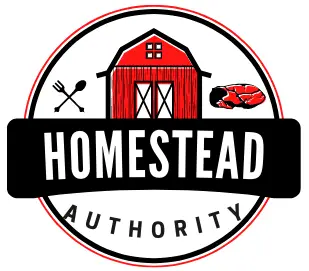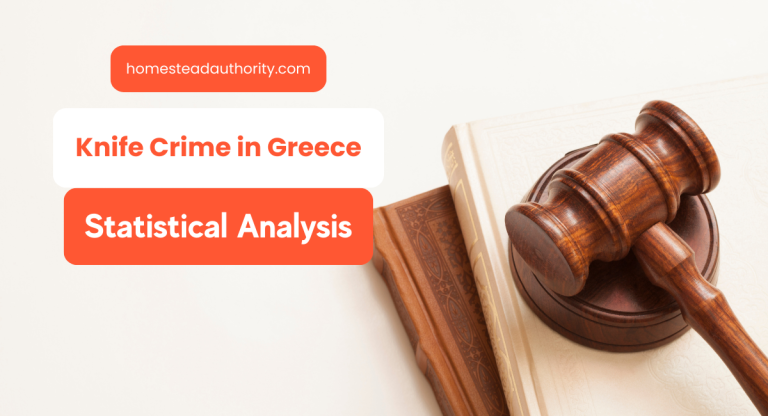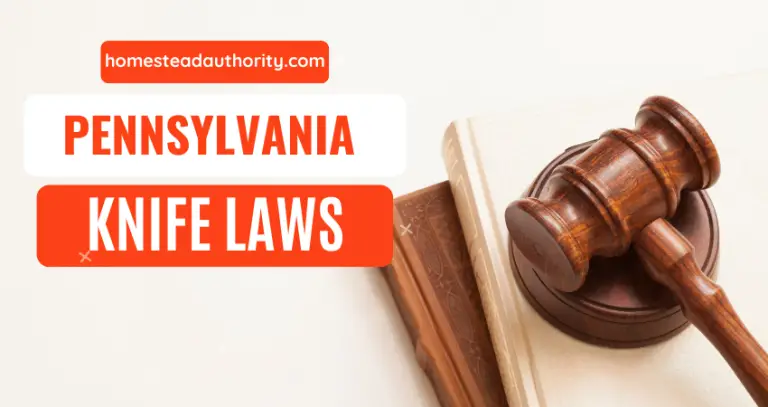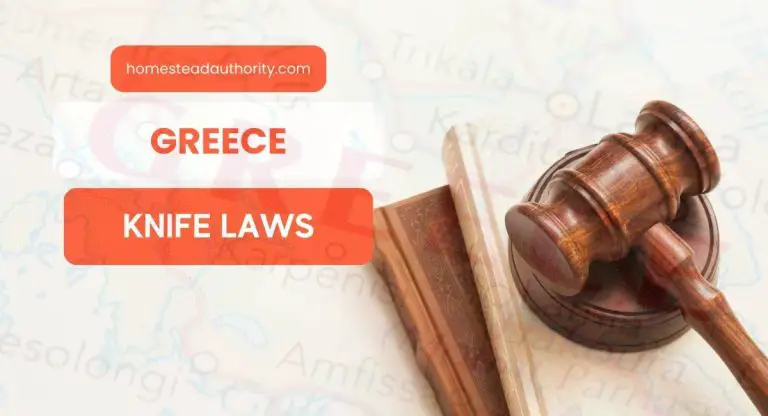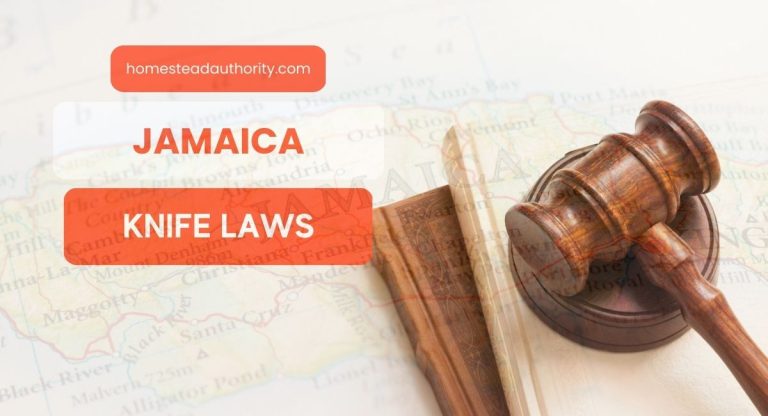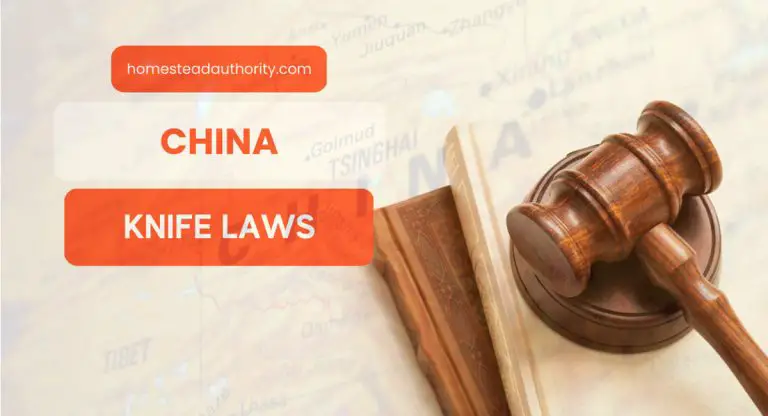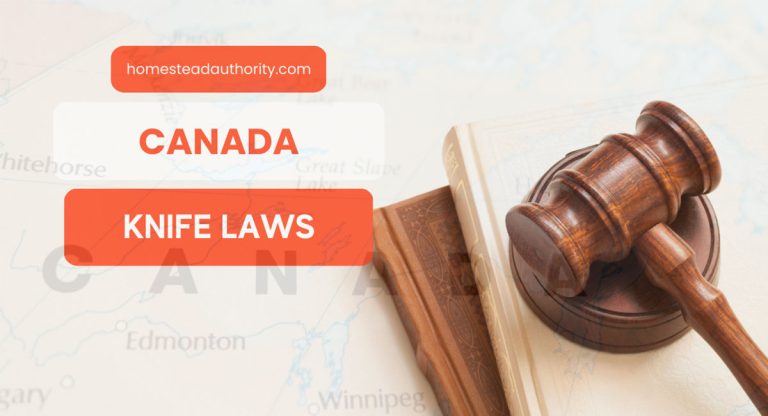Virginia Knife Law 101: Everything You Need to Know
Virginia State’s knife laws are somewhat knife-friendly in certain ways and pretty restrictive in others. You can own any knife except throwing stars, ballistic knives, and switchblade knives.
Moreover, you are likewise not allowed to sell, buy and trade such knives.
Virginia does not ban owning a knife, but many knife types are outlawed when it pertains to concealed carry.
Appropriate names and terminologies classify such blades, and many adjoining or related designs could also be classified as prohibited.
In general, open carry of knives is more acceptable following the state statutes’ provisions, but concealing carrying a knife will cause problems for you.
In this article, we will discuss the Virginia knife laws in plain English so you can better understand them, so let’s get to it:
Highlights:
- State-wide Preemption: There is no state-wide preemption for the knife laws.
- Concealed Carry: Bowie knife, switchblades, razors, ballistic knife, machete, throwing stars, oriental darts, or anything similar to that is not allowed to be concealed.
- Schools: It is a Class 1 Offense to possess any knife, excluding pocket knives with folding metal blades shorter than three inches.
- Critical Dimensions: A foldable pocket knife can only be legally carried on school property if it is no longer than three inches.
List Of Illegal To Possess Knives In Virginia
Below is the list of knives that are legal to posses in Virginia. After this list we are discussing the knife possession laws in Vriginia in detail:
- Switchblade
- Ballistic knife
- Blackjack
- Brass or metal knuckles
- Throwing stars or oriental darts
List Of Legal To Possess Knives In Virginia
Below is the list of legal to own knives in Vrigina:
- Dirk, dagger, or another stabbing knife
- Balisong or butterfly knife
- Bowie knives
- KA-BAR knives
- Machetes, and swords
- Stilettos
- Hunting knives
- Clasp knives
- Pocket Knives
- Utility knives
- Sword canes, any type of disguised knives, and any other types
Knife Ownership Laws In Virginia
Let me dive into the ownership law fist. Then I will explain everything in layman’s term.
So, the law is –
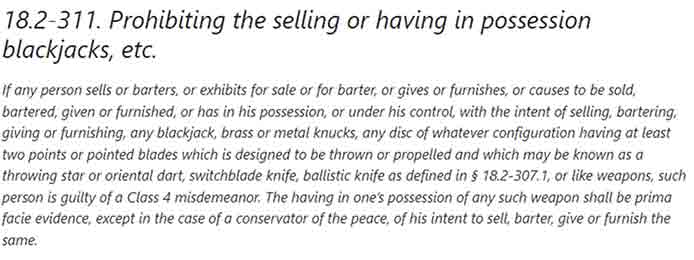
As you can see, section 18.2-311 provides a brief list of the knives prohibited from possessing inside the borders of Virginia.
You are not allowed to sell, trade, or gift a throwing star, ballistic knives, oriental darts, blackjack, and brass or metal knuckles on the state of Virginia premises.
You might ask if they explicitly prohibit the selling or trading of these knives. The law that makes it illegal to sell, trade, or gift these knives also classifies them in possession or ownership of individuals.
Because having one of these knives is considered evidence that you intend to sell it.
However, you can own the other knives legally. You can likewise trade, manufacture, give and receive them as gifts in Virginia state.
The legal to own and trade knives under section 18.2-311 are balisong, pocket knives, bowie knives, machetes, stilettos, swords, daggers, dirks, clasp knives, hunting knives, utility knives, sword canes, and any other disguised knives.
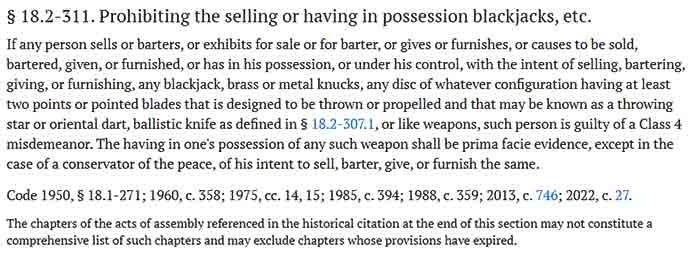
While Virginia State is somewhat flexible about owning knives but when it comes to carrying them, they are more strict.
Carrying A Knife In Virginia: This is Different from Owning One
Here is the law for carrying knives in Virginia. You have the explanation after it.
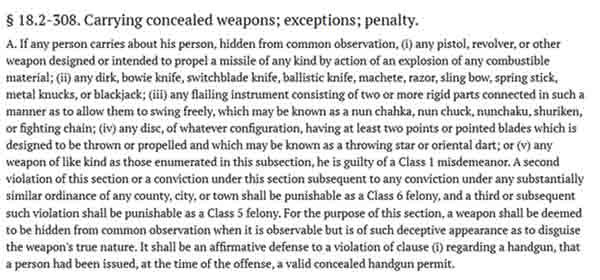
Section 18.2-308 of the Virginia Code governs the concealment of blades in Virginia.
- The following bladed weapons are prohibited from concealing carried under this section: dirks, bowie knives, switchblades, ballistic knives, machetes, razors, shuriken, throwing stars, metal knucks, blackjacks, throwing stars and oriental, and any knife even remotely resembling these knives.
- The section forbids concealed carry of the knives mentioned above. However, you are free to carry other knives in Virginia.
- Moreover, you should be mindful that since Knives like sword canes, knives in belt buckles, knives in lipsticks, and other concealed knives are inherently covered, they are prohibited from being carried in public.
- Another point to mention here is that the jury or judge can decide if a knife (be it legal) is illegal or not.
- About that, in 2000, the Supreme Court of Virginia, in Delcid v. Commonwealth, apprehended that the Delcid is guilty for having butterfly knife (which is legal to posses).
- The jury summoned that any weapon carried secretly would lead to legal penalties. If any individual has a non-weapon tool in a concealed manner will not be penalized as it is not a violation of the law.
- Moreover, the intended purpose of carrying any instrument (be it a non-weapon) will determine if it is a violation of law or not.
Penalties
Anyone who violates section 18.2-308 will be guilty of class 1 misdemeanor and one could anticipate up to 12 months in jail, a fine of up to $2,500, or both.
A subsequent or second violation of this law will lead to a class 6 misdemeanor which entails one to five years imprisonment, or confinement in jail for 12 months and a fine of not more than $2,500.
A third or subsequent violation of the law will result in a class 5 misdemeanor that leads to imprisonment of one to ten years, 12 months jail and a fine of maximum $2,500, either or both.
Exception In Knife Carry Law
There is some exception in this law that allows individuals to carry a knife:
- Working or retired law enforcement officers, law abiding hunters, legally enrolled group that deals in knives, mail carriers, employees of any state-run prison or guard service are exempted from the knife carry laws.
- You can have your knife in your place of business if your business deals with that knife.
- Commuting to or from a recognized shooting range
- Any person, while at or traveling to or from a recognized shooting range, can carry it as long as the weapons are unloaded and transported securely.
- Any person transporting such weapons between his residence and a location for purchase or repair, so long as the weapons are unloaded and wrapped securely.
- Any Commonwealth judge, lawyer, attorney or assistant Commonwealth attorney, no matter where they go within the Commonwealth premises.
In sections 18.2-308, a few terminologies might confuse you. Below we are discussing those phrases so that you get a clear idea of Knife laws in Virginia.
Definition Of The Clause “Of A Like Kind.”
The concealed carrying act uses the clause “of a like kind” to declare it unlawful to the covert carrying of any blade that is similar to one of the knives named in the statute.
An instance of this appeared during the ruling in Kingrey v. Commonwealth.
In this case, the Virginia Court of Appeals determined that when Mr. Kingrey’s butterfly knife was opened substantially looked like a dirk explicitly addressed in the act as illegal to carry a knife secretly.
So the jury concluded that Mr. Kingrey was carrying a concealed weapon, for which he encountered legal consequences.
Later in 2009, during Thompson v. Commonwealth case, the Supreme Court of Virginia ruled that the state must show that a weapon is significantly comparable to those listed in the conceal carrying act to declare that it is of the same type.
Definition Of Concealed
According to Virginia law, concealed means hidden from public view.
The phrase “hidden from common observation” has been interpreted by the Court of Virginia in several situations.
Main v. Commonwealth
The Virginia Supreme Court determined in the Main v. Commonwealth case that the person carrying the weapon in their back pocket tends to conceal it with the duffle bag.
Though the duffle bag covered the weapon’s handle, which was the only visible part of the weapon, he was still penalized for carrying a gun covertly as per conceal carry statute.
Clarke v. Commonwealth
In Clarke v. Commonwealth case in 2000, the investigation discovered that a weapon was concealed because the investigating officer could not see it until he got near the front passenger seat.
Upon looking down into Mr. Clarke’s pocket area from straight overhead, the officer noticed the weapon when he was sitting in that seat.
In this case, the Court ruled that the weapon was hidden from common observation as it was concealed from everyone, excluding those with a unique or exceptional opportunity to see it.
Definition Of The Clause “About His Person.”
The conceal carry code uses the “about his person” when referring to the covered carrying of knives.
But what does this phrase imply? Let’s see what the Court of Virginia holds for this phrase:
Leith v. Commonwealth
In Leith v. Commonwealth, the Supreme Court of Virginia addressed the definition of “about his person.”
They determined that a handgun hidden in a panel next to Mr. Leith’s seat qualified as being “about his person” since it was so near to him.
The Court further decided that the jury or the judge would settle in each case if a weapon were on the person or easily accessible.
The term “readily accessible” was further described as being available for quick and immediate usage.
Hunter v. Commonwealth
In another case, Mr. Hunter was not found guilty because he was a passenger in the car in which the gun was found.
Moreover, he had no key to the compartment where the weapon was found.
School Knife Laws In Virginia
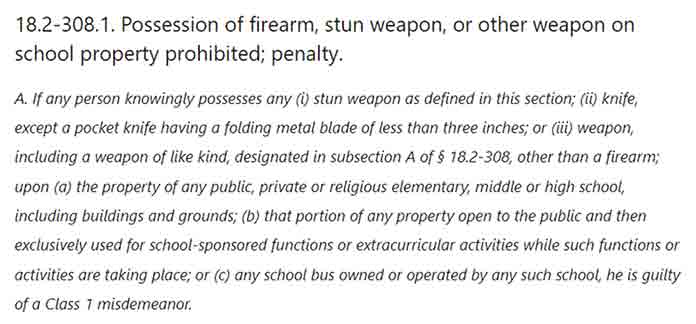
The Virginia knife laws are very clear about carrying knives and weapons around the school premises.
As per section,
Virginia is one of the few states that allow any type of knife on the school premises. Most states ban knives outrightly in schools and educational institutes.
But in Virginia, all weapons and knives are forbidden on school property, property used for school activities, and on school buses, the only exception being pocket knives.
A pocket knife must have a blade shorter than 3 inches to be allowed on school property in Virginia. Any time after that, the carrier may be accused of a crime.
The Penalty
If you are discovered on school property with a knife three inches or longer in your possession you will be penalized with a Class 1 Misdemeanor.
And Class 1 misdemeanor includes a maximum term of one-year imprisonment and a maximum fine of $2,500.
A Class 6 Felony with one to five years imprisonment, and a fine of not more than $2,500 is the result if a switchblade or other ballistic-type knife is discovered in your possession.
Knife Law In Places Of Worship
The knife law for places of worship and gathering are also very precise. According to the section,

Without a “good and sufficient reason,” you are not permitted to bring a knife into a worship facility when a religious event occurs.
It is exceedingly dangerous to carry any knife into a monastery or temple while a gathering is taking place because “good and sufficient reason” is not expressly stated in the laws.
FAQs
Below we mention some of the most common questions regarding the Virginia knife laws.
What size knife is legal to carry in Virginia?
Virginia knife laws do not provide any precise legal knife length for general carrying or owning.
However, they do allow a pocket knife having less than a 3-inches blade on the school premises.
Can you carry a knife in a car in Virginia?
According to the Virginia knife laws, if you carry any forbidden knife in the car in a concealed manner, you will encounter legal consequences.
However, if you are a vehicle passenger, you will not be charged for concealed carrying a knife.
Are there any Definitions of Knives in Virginia Knife Law?
The Virginia law only defines a ballistic knife as per which it is a knife with a removable blade that is propelled by a spring-operated mechanism.
The Takeaway?
Most knives are legal to own in Virginia, but you cannot legally carry any of them concealed.
Moreover, the Virginia knife law also forbids any type of knife on school premises except for the foldable knife less than 3-inches.
In addition, you are likewise not allowed to carry a knife to a place of worship.
In short, when it comes to Virginia knife laws, they have left a lot of blank spots in the knife law that can leave anybody perplexed.
So it is wise to investigate thoroughly before carrying any knife within Virginia.
